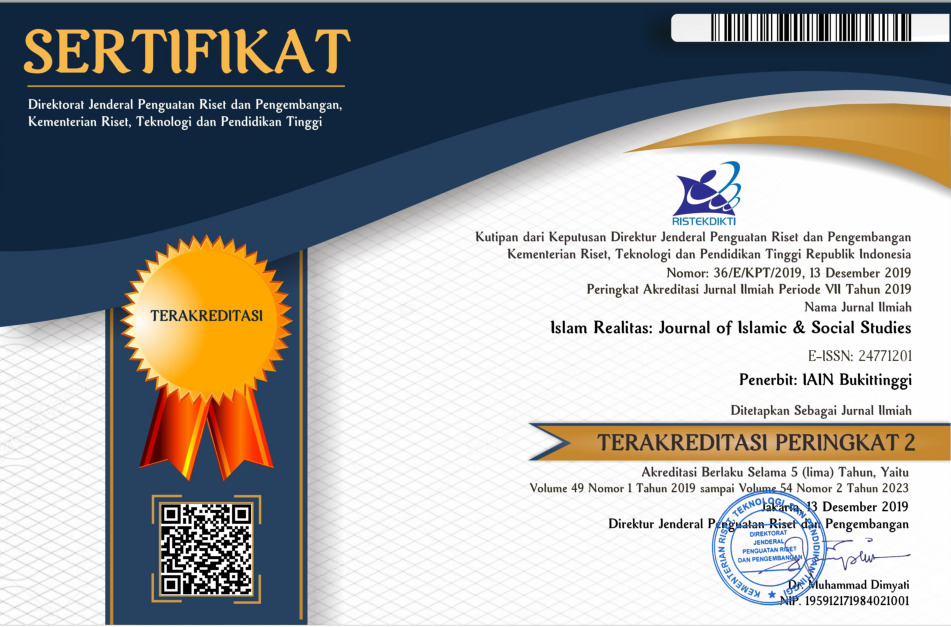Experiences from Muhammadiyah on Practices of Multicultural Education: Analysis Through Bourdieu's Concept of Social Capital
Downloads
Journals
Abdullah, M.A., ‘Islam as a Cultural Capital in Indonesia and the Malay World: A Convergence of Islamic Studies, Social Sciences and Humanities’, Journal of Indonesian Islam, 11.2 (2017), 307–28 <https://doi.org/10.15642/JIIS.2017.11.2.307-328>
Agung, Dewa, Gede Agung, Sanggar Kanto, Darsono Wisadirana, and I Nyoman Ruja, ‘Menyama Braya as Social Capital of Hindu and Muslim Community: A Case Study in Bali-Indonesia’, International Journal of West Asian Studies, 9.1 (2017), 159–66 <https://doi.org/10.22583/ijwas.2017.09.01.12>
Arafah, Muhammad, Budira, and Suarni, ‘Gerakan Dakwah Kultural Dalam Mewujudkan Masyarakat Berperadaban dalam Perspektif Muhammadiyah’, Prosiding Konferensi Nasional Ke- 7 Asosiasi Program Pascasarjana Perguruan Tinggi Muhammadiyah „Aisyiyah (APPPTMA), 2018, 158–72
Arif, Dikdik Baehaqi, and Syifa Siti Aulia, ‘Studi Tentang “Negara Pancasila Sebagai Darul Ahdi Wa Syahadah†Untuk Penguatan Materi Pembelajaran Pendidikan Kewarganegaraan di Universitas Ahmad Dahlan’, Jurnal Civics: Media Kajian Kewarganegaraan, 14.2 (2017), 206–17 <https://doi.org/10.21831/civics.v14i2.16440>
Arshad, S, and S Khurram, ‘Can Government’s Presence on Social Media Stimulate Citizens’ Online Political Participation? Investigating the Influence of Transparency, Trust, and Responsiveness’, Government Information Quarterly, 37.3 (2020) <https://doi.org/10.1016/j.giq.2020.101486>
Azra, Azyumardi, ‘Muhammadiyah: Tantangan Islam Transnasional’, Maarif :Arus Pemikiran Islam dan Sosial, 4.2 (2009), 14
Baidhawi, Zakiyuddin, ‘Muhammadiyah dan Spirit Islam Berkemajuan dalam Sinaran Etos Alqur’an’, Afkaruna: Indonesian Interdisciplinary Journal of Islamic Studies, 13.1 (2017) <https://doi.org/10.18196/aiijis.2017.0066.17-47>
Berger, PL, and RW Hefner, ‘Spiritual Capital in Comparative Perspective’, Spiritual Capital Planning, 1.3 (2003), 1–6
Berry, John W., and Colleen Ward, ‘Multiculturalism’, in The Cambridge Handbook of Acculturation Psychology, Second Edition, 2016, pp. 441–63 <https://doi.org/10.1017/CBO9781316219218.026>
Burhani, Ahmad Najib, ‘Islam Berkemajuan Dalam Periode Modern : Sebuah Transformasi Ideologis’, 2016, 2020, 1–15
———, ‘Pluralism, Liberalism, and Islamism: Religious Outlook of Muhammadiyah’, Studia Islamika, 25.3 (2018), 433–70 <https://doi.org/https://doi.org/10.15408/sdi.v25i3.7765>
Bush, Robin, A Snapshot of Muhammadiyah Social Change and Shifting Makers of Identity and Values, 221st edn (Australia: Asia Research Institute National University of Singapore, 2014)
Butt, Simon, ‘Religious Conservatism, Islamic Criminal Law and the Judiciary in Indonesia: A Tale of Three Courts’, Journal of Legal Pluralism and Unofficial Law, 50.3 (2018), 402–34 <https://doi.org/10.1080/07329113.2018.1532025>
Buxton, Lisa Maree, ‘Professional Development for Teachers Meeting Cross-Cultural Challenges’, Journal for Multicultural Education, 35.2 (2020), 19–32 <https://doi.org/10.1108/JME-06-2019-0050>
Darajat, Zakiya, ‘Muhammadiyah dan NU: Penjaga Moderatisme Islam di Indonesia’, Hayula: Indonesian Journal of Multidisciplinary Islamic Studies, 1.1 (2017), 81–96 <https://doi.org/10.21009/hayula.001.1.05>
Elhady, Aminullah, ‘Islamic Reform Movement In Indonesia: Role of Muhammadiyah in Social Empowerment’, International Journal of Academic Research in Business and Social Sciences, 7.8 (2017), 340–50 <https://doi.org/10.6007/ijarbss/v7-i8/3234>
Grishaeva, Elena B, ‘Multiculturalism as a Central Concept of Multiethnic and Polycultural Society Studies’, Journal of Siberian Federal University, 5.7 (2012), 916–22
H. Abror, Robby, ‘Rethinking Muhammadiyah: Masjid, Teologi Dakwah dan Tauhid Sosial (Perspektif Filsafat Dakwah)’, Jurnal Ilmu Dakwah, 6.1 (2014), 53 <https://doi.org/10.15575/jid.v6i1.327>
Haase Svendsen, Gunnar Lind, and Gert Tinggaard Svendsen, ‘On the Wealth of Nations: Bourdieuconomics and Social Capital’, Theory and Society, 32.5 (2003), 239–63 <https://doi.org/10.1007/1-4020-2589-0_10>
Hifza, Hifza, Antoni Antoni, Abdul Wahab Syakhrani, and Zainap Hartati, ‘The Multicultural Islamic Education Development Strategy on Educational Institutions’, Jurnal Iqra’ : Kajian Ilmu Pendidikan, 5.1 (2020), 158–70 <https://doi.org/10.25217/ji.v5i1.799>
Hilmy, Masdar, ‘Whither Indonesia’s Islamic Moderatism? A Reexamination on the Moderate Vision of Muhammadiyah and NU 1 Masdar Hilmy’, Journal of Indonesian Islam, 07.01 (2013), 24–48
Hoon, Chang-Yau, ‘Assimilation, Multiculturalism, Hybridity: The Dilemmas of the Ethnic Chinese in Post-Suharto Indonesia 1’, Asian Ethnicity, 7.2 (2006), 149–66 <https://doi.org/10.1080/14631360600734400>
Jabali, F, and Null Jamhari, The Modernization of Islam in Indonesia, ed. by Fuad Jabali, Logos (Indonesia: Logos, 2003)
Jamal, Amaney, ‘When Is Social Trust a Desirable Outcome?: Examining Levels of Trust in the Arab World’, Comparative Political Studies, 40.11 (2007), 1328–49 <https://doi.org/10.1177/0010414006291833>
Jarvis, Jonathan A., Allison W. Corbett, Jared D. Thorpe, and Mikaela J. Dufur, ‘Too Much of a Good Thing: Social Capital and Academic Stress in South Korea’, Social Sciences, 9.11 (2020), 1–14 <https://doi.org/10.3390/socsci9110187>
Kersten, Carool, ‘Indonesia’s New Muslim Intellectuals’, Religion Compass, 3.6 (2009), 971–85 <https://doi.org/10.1111/j.1749-8171.2009.00187.x>
Kumar, S, and J T Blair, ‘U.S. Healthcare Fix: Leveraging the Lessons from the Food Supply Chain’, Technology and Health Care, 21.2 (2013), 125–41 <https://doi.org/10.3233/THC-130715>
Latief, Hilman, and Haedar Nashir, ‘Local Dynamics and Global Engagements of the Islamic Modernist Movement in Contemporary Indonesia: The Case of Muhammadiyah (2000-2020)’, Journal of Current Southeast Asian Affairs, 39.2 (2020), 290–309 <https://doi.org/10.1177/1868103420910514>
Maksum, Ali, Priyono Tri Febrianto, and Esa Nur Wahyuni, ‘Interpretation of Democracy, Pluralism and Tolerance among the Young Activists of Muhammadiyah and Nahdlatul Ulama’, Masyarakat, Kebudayaan Dan Politik, 32.3 (2019), 275 <https://doi.org/10.20473/mkp.v32i32019.275-289>
Mietzner, Marcus, and Burhanuddin Muhtadi, ‘Explaining the 2016 Islamist Mobilisation in Indonesia: Religious Intolerance, Militant Groups and the Politics of Accommodation’, Asian Studies Review, 42.3 (2018), 479–97 <https://doi.org/10.1080/10357823.2018.1473335>
Nashir, Haedar, Zuly Qodir, Achmad Nurmandi, Hasse Jubba, and Mega Hidayati, ‘Muhammadiyah’s Moderation Stance in The 2019 General Election’, Journal of Islamic Studies, 2019
Patergiannaki, Z, and Y Pollalis, ‘E-Government Maturity Assessment: Evidence from Greek Municipalities’, Policy and Internet, 2022 <https://doi.org/10.1002/poi3.317>
PP Muhammadiyah, Tanfidz Muktamar Muktamar Muhammadiyah Ke-47 (Yogyakarta: Pimppinan Pusat Muhammadiyah, 2015)
Qodir, Zuly, Hasse Jubba, Dyah Mutiarin, and Mega Hidayati, ‘Muhammadiyah Identity and Muslim Public Good: Muslim Practices in Java’, International Journal of Islamic Thought, 19 (2021), 1–14 <https://doi.org/10.24035/IJIT.19.2021.203>
Rodriguez-HevÃa, L F, J NavÃo-Marco, and L M Ruiz-Gómez, ‘Citizens’ Involvement in e-Government in the European Union: The Rising Importance of the Digital Skills’, Sustainability (Switzerland), 12.17 (2020) <https://doi.org/10.3390/SU12176807>
Saputro, M. Endy, ‘Indonesian Islamic Studies: Selected Dissertation Bibliography 2000-2016’, DINIKA : Academic Journal of Islamic Studies, 1.3 (2016), 387 <https://doi.org/10.22515/dinika.v1i3.582>
Serohin, Vitalii, ‘Multiculturalism: A Human Rights-Based Approach’, Legal Knowledge, 1.January 2019 (2019), 185–200 <https://doi.org/10.36059/978-966-397-164-3/185-200>
Singh, Paramjeet, ‘Digital Citizenship: Issues and Challenges of Privacy in India’, International Research Journal of Commerce Arts and Science, 9.3 (2018), 72–86
Tayeb, Azmil, Managing Islamic Education in Indonesia and Malaysia, 2016
Wajdi, M B N, and T Tobroni, ‘Implications of Multiculturalism and Tolerance in Islamic Religious Education’, Educatio: Journal of …, 5.2 (2020)
Zuhdi, Muhammad, ‘Challenging Moderate Muslims: Indonesia’s Muslim Schools in the Midst of Religious Conservatism’, Religions, 9.10 (2018) <https://doi.org/10.3390/rel9100310>
Interviews
Naufal (Student), Interview {20 May 2022}
Nurhayati (Student), Interview {21 May 2022}
Fadel (Student), Interview {21 May 2022}
Hasse J, Mega Hidayati (Lecturer), Interview {22 May 2022}
Fadel (Student), Interview {21 May 2022}
Prj (Lecturer), Interview {20 May 2022}
Authors who publish with this journal agree to the following terms:
- Authors retain copyright and grant the journal right of first publication with the work simultaneously licensed under a Creative Commons Attribution License that allows others to share the work with an acknowledgment of the work's authorship and initial publication in this journal.
- Authors are able to enter into separate, additional contractual arrangements for the non-exclusive distribution of the journal's published version of the work (e.g., post it to an institutional repository or publish it in a book), with an acknowledgment of its initial publication in this journal.
- Authors are permitted and encouraged to post their work online (e.g., in institutional repositories or on their website) prior to and during the submission process, as it can lead to productive exchanges, as well as earlier and greater citation of published work (See The Effect of Open Access).









